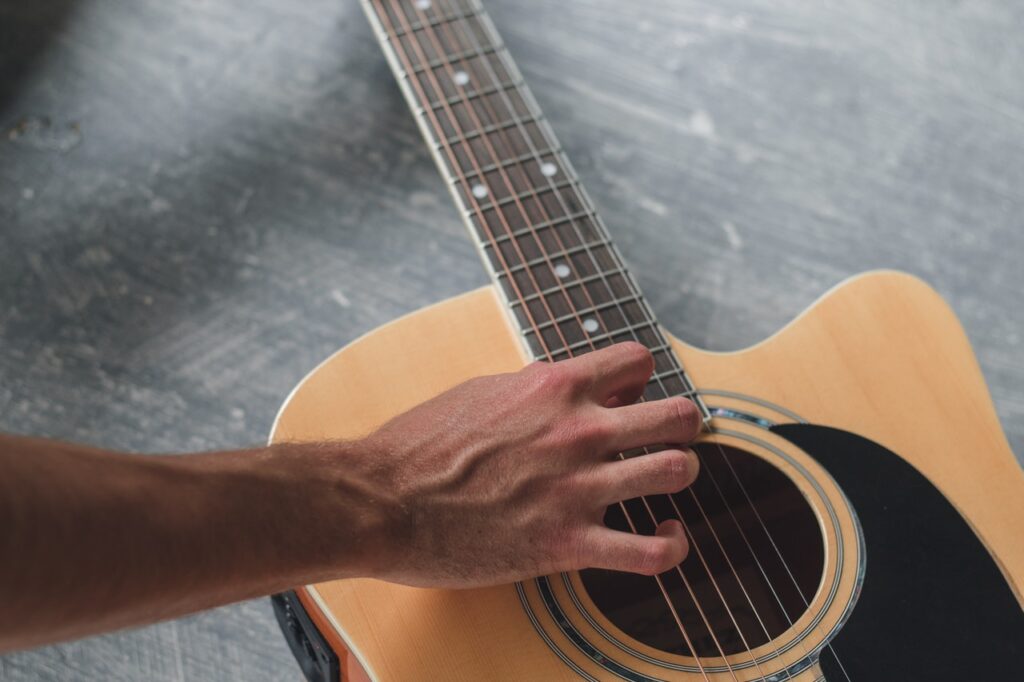
In the beginning, your guitar produces a bright and sharp sound. Over time, the tone changes and becomes duller. In that state, playing the instrument requires more effort.
Guitar strings don’t last forever as their quality changes with time, even if you don’t play them. So, how long do guitar strings last? How do you know it’s time to change the strings?
How Long Do Guitar Strings Last
It’s challenging to give out an exact period about the lifespan of guitar strings. That’s because their longevity depends on several factors. But with that said, the average uncoated guitar string lasts about one to three months.
On the other hand, coated strings register a longer lifespan; approximately nine months or even more. Coated or uncoated, the intensity and frequency of play influence the lifespan of the wires.
Sometimes they won’t snap off and stay for years. Nevertheless, the sound quality will diminish, though it will still generate some noise.
Factors Affecting the Lifespan of Guitar Strings
Type of String
The type of string significantly influences its longevity. There are mainly two types of guitar strings; nylon and metal strings.
The nylon strings are susceptible to temperature variations. Under very high temperatures, their elasticity goes down. Hence, that makes them prone to shrinking and tearing. In moderated temperatures, nylon strings last about three months.But in case you remove them from their original pack, the strings expire in about six months. Otherwise, they can last for years if you retain them in the initial case. One such promising type to consider is the D’Addario Pro-Arte Nylon Classical Guitar Strings EJ45.
On the other hand, metal strings resist higher temperature fluctuations. Top-quality metal strings, on average last 6 months. But, the lower quality one can only stretch to about three months.
Frequency and Intensity of Play
The higher the frequency and intensity of playing your guitar, the more often you’ll have to change the strings. When you strum, tune, and expose the guitar to the humid atmosphere, it wears out.
Carrying out routine maintenance and sticking to the right etiquette is vital. And if you maintain an average playtime of an hour, quality coated strings may last you months before calling for a replacement. However, a more intense play of 3 hours per day will require string replacement in a few weeks.
The Gauge of the Strings
Though hard to play, thick guitar strings sustain projections and last longer. Thin strings feel light, generate bright sound but can break easily. Furthermore, sound and strength quality differs from one material to the next.
Profuse Sweating
Individuals who sweat heavily often change their guitar strings more frequently because sweat quickly wears them down. Wiping the hands and the instrument before and after play is therefore crucial. Also, choosing coated strings helps too.
Proper Maintenance
Proper string maintenance is vital to getting the best from your musical instrument. That means using guitar string conditioners and cleaners as necessary. Poor maintenance leads to faster corrosion due to the accumulation of oil and dirt from the fingers.
Signs that You Need to Change the Guitar Strings
 If you spot one or more of the following symptoms from your guitar, then most likely you need to swap out the strings:
If you spot one or more of the following symptoms from your guitar, then most likely you need to swap out the strings:
Dull Tone
New strings produce a bright and crisp tone. Further, they are also snappy. On the other hand, the old strings give out a dull tone.
Although some people enjoy the dull and mellow tones, most professionals don’t. On the contrary, they consider it a tell-tale sign of changing the strings.
Can’t Stay in Tune
Tuning issues can arise when the strings are either new or old. But new strings require only a little bit of tweaking to give back the desired tune. And they maintain their state for a couple of days or weeks. However, when the strings are old, the problem persists.
Stiff Strings
Except for the heavy gauge versions, guitar strings bend easily. For that reason, if your chords display unusual inflexibility and require a considerable amount of effort to pluck, then consider replacing them. Corrosion makes old strings stiffer.
Discoloration
As you strum your guitar, oil and grime accumulate on the strings. In effect, it gets dull. For example, as nickel and steel strings get old, they turn gray. But bronze strings grow somehow dark brown.
Tips for Prolonging Your Guitar Strings Lifespan
Wiping the strings using lint-free clothe before and after a performance is vital. A guitar care kit seems a better solution because it gives you a string cleaner, microfiber towels, guitar polish, and fretboard oil.
Wash your hands with soap and water before you play the guitar. That helps eliminate oils from your hands.
FAQ About Durability of Guitar Strings
Do Guitar Strings Expire While in their Original Package?
If the manufacturer seals the Package correctly, it can last several years. Sealing locks away moisture and air that could otherwise promote rusting. It’s only the improper sealing that causes the degradation in quality while it’s still in its package.
Why Do Some Professionals Change their Guitar Strings Very Frequently?
Some professionals change their guitar strings weekly, just before any performance or recording session. The purpose for doing so is to get the best tone during recording or performance. Still, others who take to percussive tones may go for months before changing the strings.
How Long Do Guitar Strings Last If I Don’t Play Them?
It comes down to the storage condition and the status of the string. If it’s a humid environment, they’ll rust and degrade in quality soon. On the other hand, non-humid storage conditions may keep them in a good state for months.
Conclusion
The expiration of your guitar strings depends on several factors. And to get the best out of them, choose the right quality strings. Next, clean them often and even your hands before playing.
Besides, the proper storage condition also counts. In the end, the tone of the equipment dulls, and changing the strings is inevitable.


 Sign up to receive a free ebook: Master The Guitar in 7 days! (available for a limited period)
Sign up to receive a free ebook: Master The Guitar in 7 days! (available for a limited period)